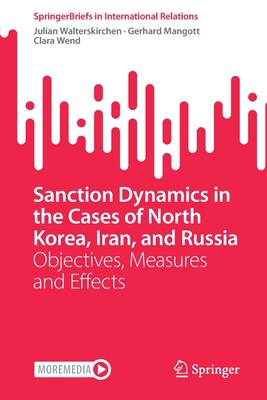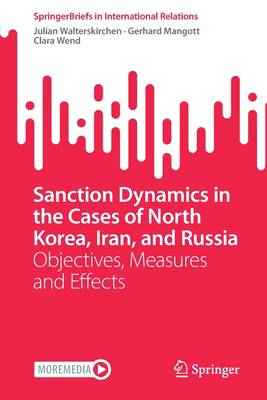
Door een staking bij bpost kan je online bestelling op dit moment iets langer onderweg zijn dan voorzien. Dringend iets nodig? Onze winkels ontvangen jou met open armen!
- Afhalen na 1 uur in een winkel met voorraad
- Gratis thuislevering in België vanaf € 30
- Ruim aanbod met 7 miljoen producten
Door een staking bij bpost kan je online bestelling op dit moment iets langer onderweg zijn dan voorzien. Dringend iets nodig? Onze winkels ontvangen jou met open armen!
- Afhalen na 1 uur in een winkel met voorraad
- Gratis thuislevering in België vanaf € 30
- Ruim aanbod met 7 miljoen producten
Zoeken
Sanction Dynamics in the Cases of North Korea, Iran, and Russia
Objectives, Measures and Effects
Julian Walterskirchen, Gerhard Mangott, Clara Wend
€ 47,45
+ 94 punten
Omschrijving
This book examines the sanction regimes imposed by the United States, the European Union, and the United Nations against Russia, Iran, and North Korea. While the application of sanctions as a foreign policy tool has developed considerably, particularly over the last three decades, their empirically verifiable effects remain contested.
Based on detailed empirical evidence, this book investigates the dynamic nature of individual sanctions measures, their multi-layered objectives as a foreign policy tool, their effects on the targeted economies and governments, and how targeted states respond to them. Furthermore, it offers a rare comparative perspective. The book presents a concise summary of the most important aspects and describes some key characteristics that could improve the use of sanctions as a foreign policy tool.
This book will appeal to researchers, scholars, and students of international relations, as well as practitioners and policy-makers interested in a better understanding of the effects of sanction regimes and the improvement of sanctions as a foreign policy tool.
Based on detailed empirical evidence, this book investigates the dynamic nature of individual sanctions measures, their multi-layered objectives as a foreign policy tool, their effects on the targeted economies and governments, and how targeted states respond to them. Furthermore, it offers a rare comparative perspective. The book presents a concise summary of the most important aspects and describes some key characteristics that could improve the use of sanctions as a foreign policy tool.
This book will appeal to researchers, scholars, and students of international relations, as well as practitioners and policy-makers interested in a better understanding of the effects of sanction regimes and the improvement of sanctions as a foreign policy tool.
Specificaties
Betrokkenen
- Auteur(s):
- Uitgeverij:
Inhoud
- Aantal bladzijden:
- 80
- Taal:
- Engels
- Reeks:
Eigenschappen
- Productcode (EAN):
- 9783031173967
- Verschijningsdatum:
- 30/11/2022
- Uitvoering:
- Paperback
- Formaat:
- Trade paperback (VS)
- Afmetingen:
- 156 mm x 234 mm
- Gewicht:
- 140 g

Alleen bij Standaard Boekhandel
+ 94 punten op je klantenkaart van Standaard Boekhandel
Beoordelingen
We publiceren alleen reviews die voldoen aan de voorwaarden voor reviews. Bekijk onze voorwaarden voor reviews.











